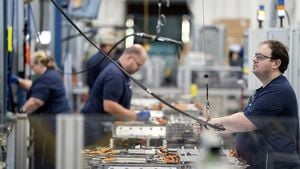DETROIT — If President-elect Donald Trump follows through on his promise to eliminate federal tax credits for electric vehicles (EVs), such action could potentially dissuade many buyers from choosing electric options over traditional gas-powered vehicles. Despite this looming threat, US auto manufacturers remain resolute, showing no signs of backtracking on the significant transition they have initiated toward electric vehicles. This determination stems largely from the substantial investments already made, amounting to around $160 billion since 2021, as reported by the Center for Auto Research.
The auto industry, once heavily reliant on gasoline-powered cars, is shifting gears, embracing EV technology at full speed. Automakers view this transition as necessary for both competitive advantage and environmental sustainability. They have dedicated considerable resources to research, development, and production of electric vehicles. This move reflects not only consumer demand for cleaner alternatives but also the broader climate goals set forth by various stakeholders.
According to industry experts, the upward trend of EV adoption is not merely dependent on government incentives. Even if Trump were to eliminate tax credits, key factors such as technological advancements and changing consumer preferences are driving the transition to electric mobility. Companies like Ford, General Motors, and Tesla have already begun diversifying their product lines to include more EV options, showcasing their firm commitment to electric vehicles regardless of the short-term financial incentives.
Another compelling aspect of this transition lies within the global automotive market dynamics. Several international automakers have announced ambitious plans to increase their electric vehicle portfolios. For example, leading manufacturers like Volkswagen, Toyota, and BMW are also investing heavily in electric technology, aiming to capture market share as consumers increasingly gravitate toward sustainable vehicles.
Environmental activists and sustainability advocates have hailed this shift as promising, arguing it could lead to significantly reduced carbon emissions if electric vehicles are powered by renewable energy sources. This campaign is not just about producing cleaner cars; it's also about changing the infrastructure to support electric vehicle use, including building more charging stations and enhancing grid capabilities.
Of course, there are skeptics who worry about the realities of the EV market, especially considering the current supply chain challenges. The pandemic exposed vulnerabilities, and now, something as simple as sourcing semiconductor chips has become a pressing issue. These challenges could delay the production readiness of certain models and the overall rollout of EVs.
There’s also the concern surrounding the future of jobs within the auto industry. Traditionally, auto manufacturing jobs, which are often well-paying, have been tied to combustion engine production. The automotive workforce is now faced with the challenge of adapting skill sets to align with new technologies. Union leaders are advocating for training programs to help workers transition to roles focused on electric vehicle production.
Despite these reservations, the auto industry appears steadfast. Executives are optimistic, citing the long-term view of the market. They believe weathering this transition, including potential hit to sales from changes to tax credits, will pay off as consumer interest grows. Notably, auto sales of electric vehicles have been on the rise, setting new records and reflecting changing attitudes toward EVs.
Meanwhile, policymakers continue to debate the future direction for EV incentives at the federal level. Many see the necessity to incentivize EV adoption, not just for environmental benefits but also for national security. Reducing dependence on foreign oil could have long-standing effects on the US economy.
Automakers understand there may be hurdles. The industry's move toward electric has been labeled as ‘the new normal,’ and such dramatic change often incites anxiety about potential fallout, as existing jobs evolve and new roles emerge. Nonetheless, automakers are optimistic, reassured by strong consumer interest coupled with increasing demand for cleaner, more efficient vehicles.
While the outcome of Trump’s presidency may pose significant changes to policies supporting the EV industry, the trend toward electric vehicles appears unstoppable. Innovation and investment have integrated themselves deeply within the fabric of automotive advancement. Challenges lie ahead, but with focus and resilience, the industry is likely to continue forging its path toward electrification.



